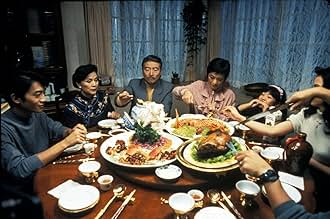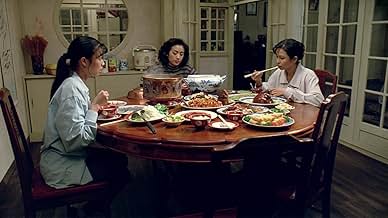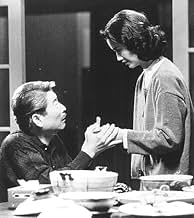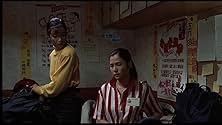A senior chef lives with his three grown daughters; the middle one finds her future plans affected by unexpected events and the life changes of the other household members.A senior chef lives with his three grown daughters; the middle one finds her future plans affected by unexpected events and the life changes of the other household members.A senior chef lives with his three grown daughters; the middle one finds her future plans affected by unexpected events and the life changes of the other household members.
- Nominated for 1 Oscar
- 6 wins & 15 nominations total
Wang Yu-wen
- Jia-Ning
- (as Yu-Wen Wang)
Chen Chao-jung
- Guo Lun
- (as Chao-jung Chen)
Ah-Lei Gua
- Madame Liang
- (as Ya-Lei Kuei)
- Director
- Writers
- All cast & crew
- Production, box office & more at IMDbPro
Featured reviews
Preparing food is a lot like making and sustaining relationships; mixing hot and cold, balancing flavors, starting with good ingredients or not, being creative, adding spice and trying new things without losing identity and soul.
A master chef and his trio of mature and live-at-home daughters are each single, unattached and in a funk. Despite living under one roof they move in separate spheres and hardly communicate. Only Sunday dinners, painstakingly made by the father, bind them together. Passions flare as each family member finds themselves on the cusp of a new relationship. Ingredients long held in deep freeze are brought to the boiling point, disparate flavors combine, and the results are unexpected and startling. The point is to savor the dish and not interfere with the cook making it, for we hardly know enough to prepare our own meal much less those of other people.
Director Ang Lee is a master at metaphor and stewing passions. Even at this early stage in his career you may witness his power and prowess in such respects. A warning: do not watch this film on an empty stomach, for the cooking scenes will make your mouth water and whatever is in your pantry - be it raw flour or curry powder - will certainly be consumed in a fit of madness and feeding frenzy.
A master chef and his trio of mature and live-at-home daughters are each single, unattached and in a funk. Despite living under one roof they move in separate spheres and hardly communicate. Only Sunday dinners, painstakingly made by the father, bind them together. Passions flare as each family member finds themselves on the cusp of a new relationship. Ingredients long held in deep freeze are brought to the boiling point, disparate flavors combine, and the results are unexpected and startling. The point is to savor the dish and not interfere with the cook making it, for we hardly know enough to prepare our own meal much less those of other people.
Director Ang Lee is a master at metaphor and stewing passions. Even at this early stage in his career you may witness his power and prowess in such respects. A warning: do not watch this film on an empty stomach, for the cooking scenes will make your mouth water and whatever is in your pantry - be it raw flour or curry powder - will certainly be consumed in a fit of madness and feeding frenzy.
Ang Lee has turned what might have been merely an extended Taiwanese soap opera into a wise and warm exploration of family relationships, love and friendship, against the backdrop of a traditional society adapting to the modern world. Fascinating in themselves, the food preparation sequences serve as a metaphor for the skill required to transform bare existence into a rich life (and perhaps also as a metaphor for film making, where similar care and deftness are required).
The film focuses on the strained relations between master chef Chu (Sihung Lung) and his three unmarried daughters, and on the relationships of all four in love and at work. These relationships run the gamut from first love to love the second time around; from those based almost solely on sex to those based on none. (Some of the most touching scenes are those between Chu and his older colleague Wen (Jui Wang.))
Via the various workplaces Lee subtly shows us the changing face of Taiwanese society. Despite her father's profession, and seemingly with his approval, his youngest daughter works in a fast-food outlet; the eldest has converted to Christianity, and teaches science to boys, who treat her with a mixture of traditional deference and western-style insolence; the middle daughter is a successful airline executive, but only because time-honoured attitudes debarred her, as a woman, from following in her father's footsteps as a cook.
Unlike the classic Hollywood film, there is little out-and-out conflict in this movie, which seems to be based more on the Chinese philosophical concept of Yin and Yang, mutually dependent opposites. But whatever its underlying cinematic rationale, it is a masterpiece.
The film focuses on the strained relations between master chef Chu (Sihung Lung) and his three unmarried daughters, and on the relationships of all four in love and at work. These relationships run the gamut from first love to love the second time around; from those based almost solely on sex to those based on none. (Some of the most touching scenes are those between Chu and his older colleague Wen (Jui Wang.))
Via the various workplaces Lee subtly shows us the changing face of Taiwanese society. Despite her father's profession, and seemingly with his approval, his youngest daughter works in a fast-food outlet; the eldest has converted to Christianity, and teaches science to boys, who treat her with a mixture of traditional deference and western-style insolence; the middle daughter is a successful airline executive, but only because time-honoured attitudes debarred her, as a woman, from following in her father's footsteps as a cook.
Unlike the classic Hollywood film, there is little out-and-out conflict in this movie, which seems to be based more on the Chinese philosophical concept of Yin and Yang, mutually dependent opposites. But whatever its underlying cinematic rationale, it is a masterpiece.
Eat, Drink, Man, Woman is one of the best films of all time. It has all the elements of a great movie. From the opening shot to the final I was absolutely riveted to this compelling, truthful, beautiful, and humorous look into the lives of a Taiwanese family. Ang Lee, known quite famously now for "Crouching Tiger, Hidden Dragon" and the upcoming "Hulk" has done a masterful job of directing and storytelling. The cinematography is INCREDIBLE. The movie as mentioned focuses on on Widower, Master Chef Chu, who is having a hard time relating to his three independent daughters. He attempts to communicate his love for them by creating these incredible gourmet dinners. The daughters are very defined, each with a different personality. The eldest, is a Christian, which is the first time in a movie I have ever seen, where a Christian is portrayed in a favorable light. She is struggling with being an old maid and the fear of leaving her Father uncared for if she does get married. The second daughter is wild and rebellious. She is portrayed extremely well by the ultra sexy Chien Lien Wu. This woman is absolutely stunning!!! She is torn between three things, her career, her desire to be independent, and her liason's with two men, one who is married. The third daughter is portrayed sweetly and innocent who ends up stealing her best friends boyfriend away. There are many plot twists and turns, but in the end, the movie finishes in a beautiful and happy way. I have now watched this movie twenty times and I think it is a great contribution to the film world. I wish more people knew about it here in the States. This movie can move you to being a better person. On a side note, I highly recommend you order some Chinese food, because you will be starving for it before the movie is over.
The well-traveled metaphor of food as communication is given a tender, appealing treatment in Ang Lee's finely observed film about a widower whose aging and loneliness have caused him to lose touch with his three grown daughters, each of whom is looking for love in modern-day Taiwan. The father (a gallant Sihung Lung) is a master chef who has begun to lose his sense of taste while attempting to come to grips with his daughters' increasing independence and the failing health of his best friend (Jui Wang); he begins to question the basis of existence, namely love and food. The daughters, meanwhile, feeling cramped by their father's distance, begin to explore notions of freedom from their cramped quarters. Lee is in a positive, sympathetic frame of mind here, articulately exploring the theme of alienation that he would later revisit with a much more gloomy perspective in `The Ice Storm' and though the film holds virtually no surprises, it is a stylistic success, easy to like and moving effortlessly with a superior sense of rhythm; it's always pleasing, even when the content feels overly familiar. He demonstrates a healthy respect for his characters (with the exception of a divorcee whose bitter views of marriage don't stop her from pursuing Lung)--everyone gets to play out their lives with dignity and happiness and without an ounce of filmmaker moralizing.
This movie is a visually sumptuous confection served up by Ang Lee as a follow-up to The Wedding Banquet.
While some people may be put off that the film is in Mandarin with subtitles (and the DVD does not have a dubbing option), the film is so strong visually that you forget about the subtitles and just admire the thoroughly delightful story.
I found the film's theme very interesting...that life constantly surprises, especially if one opens themselves up to life's possibilities.
Nothing in this film plays out like you expect it to. It is the single common thread between the multiple story lines. If this film has a flaw it is that too many of the changes happen too suddenly, without an examination of the processes that led to the sudden developments.
The food scenes in this film are to die for. In this case, as opposed to being a primarily carnal sensual experience as it is in films like "Chocolat" and "Like Water For Chocolate," food also takes on a rhythmic intensity and meter here. There is amazing energy and balance displayed in the preparation and presentation of the meal. Sort of like Feng Shui for the tummy.
Bon Appetit.
While some people may be put off that the film is in Mandarin with subtitles (and the DVD does not have a dubbing option), the film is so strong visually that you forget about the subtitles and just admire the thoroughly delightful story.
I found the film's theme very interesting...that life constantly surprises, especially if one opens themselves up to life's possibilities.
Nothing in this film plays out like you expect it to. It is the single common thread between the multiple story lines. If this film has a flaw it is that too many of the changes happen too suddenly, without an examination of the processes that led to the sudden developments.
The food scenes in this film are to die for. In this case, as opposed to being a primarily carnal sensual experience as it is in films like "Chocolat" and "Like Water For Chocolate," food also takes on a rhythmic intensity and meter here. There is amazing energy and balance displayed in the preparation and presentation of the meal. Sort of like Feng Shui for the tummy.
Bon Appetit.
Did you know
- TriviaThe opening sequence - in which a Sunday lunch is lovingly prepared - took over a week to film.
- GoofsAs Chu is downing shots at the last Sunday dinner, he spills some on the collar of his jacket. When he stands up to makes his announcement, the stain is gone.
- SoundtracksAve Maria
Composed by Giuseppe Verdi
Performed by The Westminster Choir
Courtesy of Chesky Productions, Inc.
Details
- Release date
- Countries of origin
- Languages
- Also known as
- Comer, beber, amar
- Filming locations
- Production companies
- See more company credits at IMDbPro
Box office
- Gross US & Canada
- $7,294,403
- Opening weekend US & Canada
- $155,512
- Aug 7, 1994
- Gross worldwide
- $7,294,403
- Runtime
- 2h 4m(124 min)
- Color
- Sound mix
- Aspect ratio
- 1.85 : 1
Contribute to this page
Suggest an edit or add missing content





































